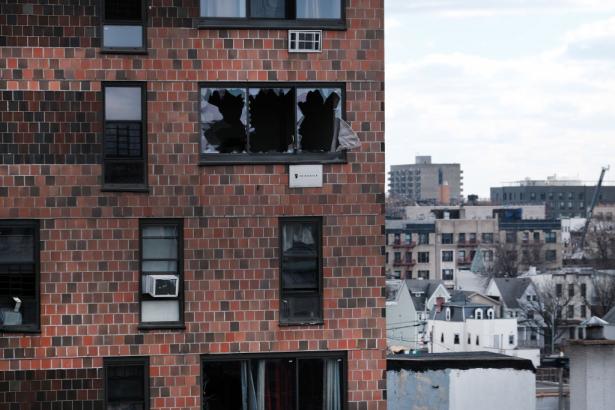You’re cold. Your apartment is poorly heated and poorly insulated. You wear your coat inside, and you’ve used the oven to heat your living room before. You have a right to heat and hot water, so you complain to your landlord. But your landlord is three different real estate investment groups, from three different states, who openly brag about how many low-income housing units they own, and whose leadership does not look like you.
Your complaint gets added to a list in a city database to be rectified — sometime. You want to be warm now, so you run a space heater, just like everyone else in your building. Yours is defective and catches fire.
The fire alarm goes off, as it has falsely countless times before. When you realize that it’s real this time, you gather your family and run for your life.
In doing so, you fail to notice that the automatic fire door (which your three corporate landlords are required by law to maintain) malfunctions and doesn’t close behind you. It’s this last bit, according to your mayor, that causes the deaths. “We took away one lesson from this,” New York City mayor Eric Adams says, “and it’s closing of the door, it’s imperative.”
Never mind all the heat complaints in the building, the faulty alarms, the nonfunctioning doors. You forgot the door — it’s your fault. But don’t worry, he says to assuage you: “All of us make mistakes.”
Adams’s analysis of the fire in the Bronx on January 9 that killed at least seventeen people is only as deep as his cronies and financiers in real estate will allow. Staggeringly, a founder of one of the burnt building’s landlord corporations is a housing adviser on Adams’s transition team, a position gained through years of schmoozing and campaign contributions.
The proximity of real estate money to the mayoral office is a victory for the city’s landlords in a political ecosystem designed to churn them out. The fine for not properly heating your building is a couple hundred dollars; the three corporations that own the Twin Parks North West building, Camber Property Group, LIHC Investment Group, and Belveron Partners, all boast control of billions of dollars of assets. The ineffectuality of these penalties is clear: over 90,000 heat complaints have been filed against New York City landlords since October 1. And that’s just from people who are bold enough to file them: tenants in the city have confessed to not asking their landlords for necessary repairs out of fear of reprisal or being served with an eviction notice.
Despite the boo-hooing that being a landlord is both a significant personal financial risk and a difficult, legitimate full-time job (if you’ve ever read the comments section of a New York Times article on evictions in New York, you know what I mean), the tenants who pay for entire buildings and their maintenance fear eviction for asking their landlords to do anything, while landlords passively build equity off tenants’ backs.
Should a landlord make a profession of cashing checks and ignoring complaints, if her building does happen to go up in smoke and kill its residents, she needn’t worry: the mayor’s got her back. All of us make mistakes.
So, if you’re a tenant, where do you turn for protection, if not your landlord or the mayor of your city? Don’t expect help from the governor. Kathy Hochul, who has already accepted tens of thousands of dollars in donations to her reelection campaign from New York landlords and developers, gave the go-ahead for landlords to start eviction proceedings against over 100,000 New York City tenants, which had previously been frozen under the state’s eviction moratorium. (The New York Times reports that there are “fears” that the end of the moratorium will cause increases in crime and homelessness, which is about the same as reporting that a man jumping into a lake “fears” getting wet.)
With their city and state executives bought out by real estate interests, the hopes of New York City tenants currently lie in the state assembly, where the good cause eviction bill is in committee. The bill, proposed by state senator Julia Salazar and cosponsored by other socialist assemblymembers, would prevent landlords from evicting or refusing to renew leases of any tenant who follows their lease and pays their rent. This would empower tenants to request necessary repairs, file complaints against their landlords, and — perhaps most critically — participate in tenant unions, all without fear of retaliation.
While a meaningful protection for New York tenants, the good cause bill is not a panacea for the abusive and extractive practices of landlords, and its passage would not put an end to the struggle of renters. The barbarity of evictions in the dead of a New York winter must be outlawed. Quality, affordable housing must be constructed en masse. The segregation of the city’s housing stock into some apartments under rent regulation and some apartments where landlords can jack the rent up at will must be bridged with universal rent control.
We New Yorkers pay landlords’ mortgages, we pay for the repairs to our buildings, and it is our labor that powers our city. It’s time we collect on what we pay for.
Nicholas Boni is a writer, photographer, and musician who lives in Brooklyn.


Spread the word